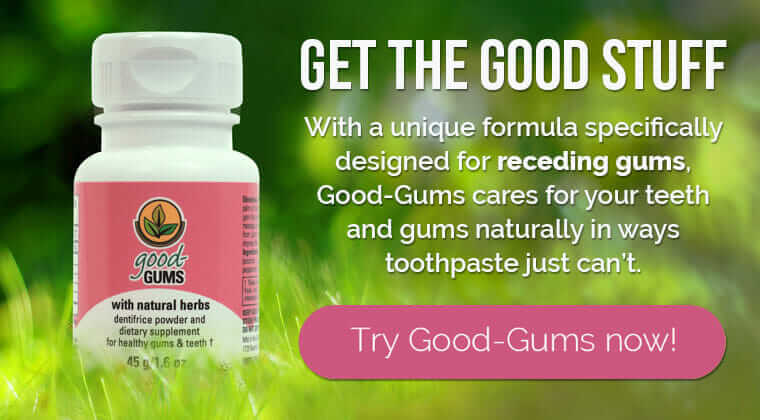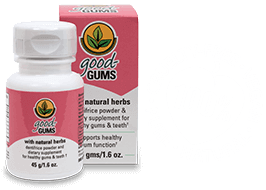Top 5 tips to stop receding gums

We understand that noticing your gums gradually disappearing to reveal more of your teeth each time you look in the mirror is disheartening. The fears about looking older and eventually losing all your teeth begin to creep in, you avoid smiling as widely as you once did and your confidence begins to dwindle. But we’re here to tell you, don’t fret! You can have your gums back!
How do we get so ‘long in the tooth’?
First of all, let’s look at what it means when gum recession starts to take hold. When gums begin to recede it means that the gum cells covering the root of your teeth are slowing dying away to expose the lower part of your teeth. Gum recession is caused by a severe gum infection, which begins with bacteria invading gum cells. It is also possible that gum recession could be caused by an irritation or reaction to certain personal habits and tendencies or chemical irritants.
As mentioned in our article ‘Our TOP 5 Tips to Beat Bleeding Gums‘, it can take as little as 24 hours for plaque to turn into hard calcified tartar or calculus that begins to cement onto the gum line if left untreated. As the gum tissue comes into contact with this acidic build-up of tartar, the immune system starts to kick in and attack the invading bacteria, which is trying to kill off your alive gum cells. As the immune cells and invading bacteria fight it out, this causes gums to inflame resulting in what is known as gingivitis – the first stage of gum disease.
If the immune cells lose the battle against the invading bacteria, the immune system then begins to try something different to save the remaining healthy gum cells. This means killing off the infected gum cells, where the infection then moves from gingivitis to periodontal disease. If the process of killing off infected cells continues, this can seriously affect the deeper structural cells that connect the tooth’s root to the jawbone, which is when gum recession starts to take place.
1. Eliminate ‘bad bugs’ and enjoy the process.
We know we always say this but it’s extremely important to take good care of your oral hygiene. Make sure that you’re adequately brushing and flossing at least twice a day but more importantly, take it easy when brushing your teeth. Receding gums can sometimes be a result of overly aggressive brushing so we recommend that you use a soft toothbrush and rather than use what could be mistaken as scrubbing your teeth, make sure you are brushing softly, preferably in a circular motion and with more awareness to your brushing technique. Rather than carelessly going through the motions as fast as possible to get your oral routine over with, pay attention and enjoy the sensations of caring for those precious pearly whites!
2. Crank up the immune system.
This will inevitably be a major point we make in all of our advice we give to get you and your mouth on the road to recovery. Because we believe it to be one of the most important points of all. A healthy diet is essential to maintaining good oral health! Numerous studies show a direct correlation between what we put into our bodies and what shows on the outside. Most of the time when disease begins to take hold of our bodies, it can be traced to a nutritional deficiency and poor diet that causes the immune system to become less effective.
For a more detailed explanation of the essential vitamins for oral health and which nutritious foods to find them in, check out our article, ‘Fantastic Four Fat Solubles and Why We Need Them’.
3. Exercise your jaw and RELAX before bedtime.
Bruxism is another common cause of gum recession and is usually a by-product of nervousness or anxiety. Bruxism essentially means repetitive grinding of the teeth and clenching or stressing of the jaw, which typically happens during sleep. This puts great stress on the periodontal ligaments and can cause cells to separate from the tooth, creating deeper infection by allowing bacteria to infect deeper tissue. We recommend that before bed you spend a few moments giving some TLC to your jaw.
3 exercises that your jaw will Love:
- Open your mouth as widely as you can, holding for a few moments, and then slowly release to close your mouth. Repeat 3 times. This releases any tension in the jaw.
- Gently move your jaw from side to side between 5 – 10 times, releasing further tension.
- Use your fingers to gently massage the hinge of your jaw bone, in a downward circular motion. Keep massaging around the jaw bone until your fingers meet at the center of your chin.
aaaand relax…
One more thing we strongly recommend you do before bed is relax. Relaxation is what we believe to be the key to an improved feeling of well-being and happiness, not to mention the key to an improvement in your overall health.

Sometimes reading an uplifting book, drinking a herbal tea or listening to soft music can be a great way of helping you feel more relaxed before bedtime. Alternatively, we recommend a short breathing exercise, which involves counting 10 long breaths while being aware of the air going in and out of your belly. Very slowly inhale, hold for a moment, and then slowly exhale.
This is a great stress reliever that will really help you to get a restful night’s sleep and can even help to elevate your mood when you arise in the morning.
Please note: for severe cases of bruxism, a mouth guard may be necessary.
4. Give up chemical irritants and drink more water.
We know some of you may not want to hear this, but smoking, alcohol, carbonated drinks, and drugs (prescribed and recreational) are all massively contributing to the deterioration of your gum health. The effects of the above list on our bodies are varied, however, each have one thing in common, they all have the exceptional ability to strip all good bacteria from your mouth. ‘Dry mouth’ is a common occurrence, when using any kind of chemical irritant, which is the name given when saliva flow is significantly reduced, causing the mouth to feel dry.
A regular flow of saliva is vital when it comes to keeping our mouths healthy. Saliva neutralizes acids, which reduces the amount of ‘bad bacteria’ present in the mouth and contains essential minerals that help rebuild tooth enamel. Therefore, inadequate saliva flow can cause gum tissue to become vulnerable to disease and infection. Please read Tip 4: ‘If you’re a smoker, quit now’ in our article ‘Our TOP 5 Tips to Beat Bleeding Gums‘, to understand more about the effects tobacco has on our oral health.
And not only do we recommend that you consider giving up or at least significantly decreasing your use of chemical irritants, we also advise that you up your daily intake of water! For optimal health, we suggest you drink about ¾ of a gallon or a dozen 8-oz glasses of water a day. This ensures a continuous saliva flow to keep flushing out all those nasty toxins and excess sugars that are eroding your gums.
5. Use our natural tooth powder every day!
Yep, you guessed it!! Regular use of Good-Gums all-natural tooth and gum powder is our top tip when it comes to stopping gum recession in its tracks! Our all-natural tooth powder works absolute wonders in helping your gum tissue start regenerating itself. The ingredients we use are 100% pure and have undergone multiple screening procedures to ensure the absolute best quality for you and your gums. We jam pack as many vitamins and minerals into this little nature-friendly bottle so that with every use you can actually feel your gums absorbing the goodness that is present in every particle of this tooth powder.
Try not to feel disheartened. Most people have suffered from some type of gum problem at one point in their lives. Our top tips aim to provide you with some safe and easy steps to begin helping your gums heal in a healthy way. If you have any questions please comment below and we will be happy to help.

Subscribe To Our Newsletter
Be the first to receive all our news, offers and natural oral health tips and articles.



Hi –
I’ve heard great things about GOOD GUMS – and look forward to trying it out.
One quick question. At first glance, the Vitamin C in your product is in the form
of ascorbic acid. Which I believe is more acidic than, say, an ascorbate form. Could this
ascorbic acid harm the tooth enamel in any way? Or is the acidity necessary to
counteract any bacteria on the tooth surface?
Thanks for any clarity you can bring to this issue.
All the best –
Daniel
Hi Daniel,
Vitamin C is a very important ingredient, but not to counteract bacteria on the tooth surface. It’s an important part of the Good-Gums formula because the gums directly absorb it and the body requires a lot of vitamin C in order to produce healthy connective tissue gum cells.
Concern about vitamin C on tooth enamel is valid, and we’ve taken that into consideration. The Good-Gums formula contains a lot of baking soda, not only to reduce the acidity of the oral environment but also to buffer the acidity of the vitamin-C. When isolated by itself, vitamin-C is acidic enough to start causing acidic erosion of tooth enamel. But the amount of baking soda in Good-Gums causes the formulated powder to be alkaline, not acidic, so that acidic tooth erosion will not occur. But then the inclusion of both an acidic ingredient and an alkaline ingredient in the same bottle raises the possibility that they will chemically react with each other in the bottle, and that the vitamin-C will be degraded before you have even received your shipment. So our formula is produced and delivered as a dry powder, preventing the chemical reaction from starting until moisture or humidity is introduced to the ingredients. In your mouth, saliva dissolves the powder, but your gums absorb the vitamin-C before the acidic and alkaline ingredients can substantially deactivate the vitamin-C. So an important part of the Good-Gums formula is the inclusion of Vitamin-C, which the gums directly absorb and which the body requires as an essential nutrient in order to produce healthy connective tissue gum cells.
I hope this information is useful. Thanks for your question.
Good-Gums